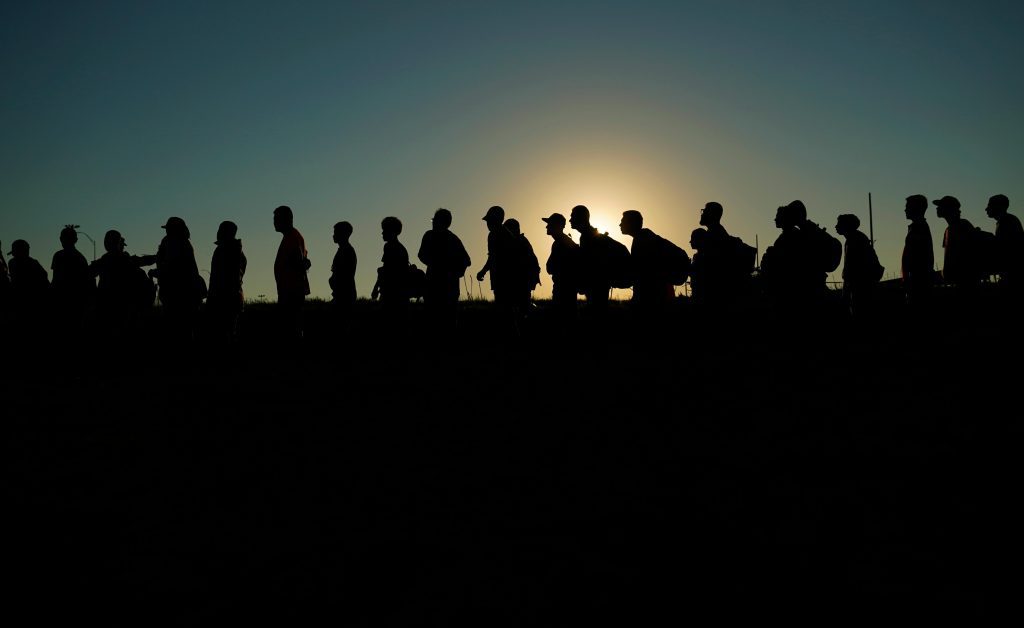By VALERIE GONZALEZ (Associated Press)
Plans by Texas to arrest migrants suspected of entering the U.S. illegally were put on hold again on Wednesday, causing uncertainty along the border and anger from Mexico during the brief time the law was allowed to take effect.
Late on Tuesday, a 5th U.S. Circuit Court of Appeals panel ordered a hold on Texas’ expansion into border enforcement. Earlier that day, the U.S. Supreme Court had allowed the strict immigration law to take effect, giving a win to Republican Gov. Greg Abbott and encouraging GOP lawmakers in other states.
However, later in a 2-1 order, an appeals court panel once again paused the Texas law ahead of oral arguments scheduled for Wednesday, creating legal uncertainty. It was not clear when the next decision might come.
During the brief time the law was in effect on Tuesday, Texas authorities did not announce any arrests or confirm whether it was being actively enforced. Sheriff Brad Coe in Kinney County along the border supported the arrest powers but said deputies would need probable cause.
Sheriff Coe said, “It is unlikely that observers will see an overnight change.” His county includes a stretch of border near Del Rio that was previously busy for illegal crossings but has become quieter.
The Supreme Court did not rule on the merits of the law but sent the challenge led by the Justice Department, arguing that Texas is overstepping the federal government’s authority, back to the lower appeals court.
The latest appeals court order did not include an explanation from the panel but had the effect of reinstating an injunction issued in February by U.S. District Judge David Ezra, who criticized the law on multiple fronts. His 114-page opinion dismissed Republicans’ claims of an “invasion” along the border due to record-high illegal crossings. Ezra, an appointee of former President Ronald Reagan, also warned that the law could harm U.S. foreign relations.
Under the Texas law, once defendants are in custody for illegal entry, they can agree to leave the U.S. or face prosecution. On Tuesday, Mexico’s Foreign Affairs Secretary said in a strongly-worded statement that it would refuse to take anyone back who is ordered to cross the border.
“Mexico reiterates the legitimate right to protect the rights of its nationals in the United States and to determine its own policies regarding entry into its territory,” the government said.
The impact of the Texas law extends beyond the border. Republican legislators designed the law to apply in all 254 counties, although Steve McCraw, the director of the Texas Department of Public Safety, has said he expects it will mostly be enforced near the border.
Other GOP-led states are already considering following the path of Texas. In Iowa, the state House approved a bill on Tuesday giving its state law enforcement the power to arrest people who are in the U.S. illegally and have been previously denied entry into the country.
Republican Gov. Kim Reynolds will decide on it. If she signs it, it will start in July.
Republican Iowa state Rep. Steven Holt said that the federal government has given up its responsibilities and states can and should take action.
El Paso County Judge Ricardo Samaniego, the top county executive in Texas, said that immigration enforcement should stay a federal responsibility, echoing the Biden administration’s view. He mentioned that increased law enforcement presence during a previous migrant surge in El Paso resulted in high-speed chases and traffic stops based on assumptions of illegal immigration.
Samaniego said, “We experienced accidents and injuries that gave us a glimpse of what could happen if the state takes control of immigration matters.”
Skylor Hearn, executive director of the Sheriffs’ Association of Texas, mentioned that sheriffs’ offices have been undergoing training since last year.
Hearn said, “If a county chooses to take on this responsibility, they are also choosing for their taxpayers to take on this responsibility. As long as the federal government fulfills its duties, it is best for them to take charge and custody of these individuals.”
Daniel Morales, a law associate professor at the University of Houston Law Center, stated that the Texas law will be very difficult to enforce.
Morales said, “It’s evident that Greg Abbott wants to enforce the law for publicity, but it will require significant state resources to implement. It remains uncertain how much interest and capacity the state government actually has.” Morales said enforcing the law in Texas will be challenging and demanding.
In January, arrests for illegal crossings dropped by half from a record high of 250,000 in December, with significant declines in Texas. Arrests in the Border Patrol’s Del Rio sector, where Abbott is focusing enforcement efforts, decreased by 76% from December. The Rio Grande Valley, which has been a major corridor for illegal crossings, recorded its lowest number of arrests since June 2020.
Tucson, Arizona, has been the most active corridor in recent months, followed by San Diego in January. However, sudden shifts in activity are often complex and controlled by smuggling organizations.
During President Joe Biden's second visit to the border as president, administration officials attributed the decrease in arrests in the Rio Grande Valley to heightened enforcement by Mexico. They mentioned that the conditions were more difficult for Mexican law enforcement in Sonora, the state south of Arizona.
___
This report includes contributions from Associated Press writers Acacia Coronado in Austin, Texas; Juan A. Lozano in Houston; Christopher Sherman in Mexico City; and Scott McFetridge in Des Moines, Iowa.









